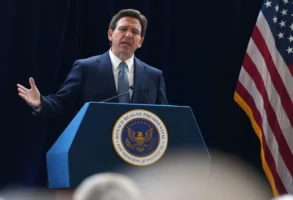Published June 2, 2015
Defenders of the College Board’s controversial new AP U.S. History (APUSH) framework like to paint their opponents as ignorant chauvinists who want to censor the bad bits out of American history. That’s going to be awfully hard to do now that 55 distinguished historians, Americanists, and education specialists have issued a powerful condemnation of the College Board’s revisionist history.
The statement’s signatories make it clear that they favor a “warts and all” account of American history that nonetheless emphasizes the ways in which “we remain one nation with common ideals and a shared story.” I cannot improve upon this statement, which will almost certainly stand as a landmark in our public debates about what sort of country we are and want to be. I recommend that you read it forthwith, along with the excellent commentary on it by Peter Berkowitz. (Note that the bottom of the statement contains instructions for those with professional competence in the study or teaching of American history who wish to add their names to the list of signatories.)
Having taken on the College Board’s ill-advised U.S. history changes on numerous occasions (eg. here, here, here, and here), I don’t pretend to neutrality on this statement. In fact, several of the statement’s signatories consulted me on the issue, and I helped alert several others to the project.
I’ll have plenty more to say about the APUSH battle in the coming weeks, since the controversy is going to come to a boil this summer. For now, I want to take a closer look at the scholars who signed this statement. If you want a quick tour of American historical scholarship that runs against the progressive grain (along with links to some important historical work that deserves to be better known), read on.
So who signed the scholars’ statement? There are plenty of prominent public intellectuals, including National Association of Scholars founder, Stephen Balch, Notre Dame’s Gerard Bradley, UVA’s James Ceaser, Princeton’s Robert George, Stanford’s Victor Davis Hanson, Brooklyn College’s Robert Davis (KC) Johnson, U. of Chicago’s Leon and Amy Kass, Claremont McKenna’s Charles Kesler, my EPPC colleague, Yuval Levin, NYU’s Herb London, U. of Oklahoma’s Wilfred McClay, the Manhattan Institute’s Myron Magnet, Harvard’s Harvey Mansfield, City University’s Ron Radosh, Hillsdale’s Paul Rahe, Loyola Maryland’s Diana Schaub, U. of Arkansas’ Sandra Stotsky, and Harvard’s Stephan Thernstrom.
Two former Chairs of the National Endowment for the Humanities, Lynne Cheney and Bruce Cole, also signed the statement, along with former NEH Deputy Chair and former St. John’s College Santa Fe president, John Agresto. Cheney, of course, kicked off the predecessor to the APUSH controversy, the clash over the National History Standards issued in 1994. At Cheney’s urging, those standards were condemned by the U.S. Senate by a vote of 99 to 1 (the lone dissenter was holding out for an even stronger condemnation). Cheney jumped into the AP U.S. History controversy this past April with a powerful follow-up to the famous 1994 Op-Ed that launched the previous history war.
Without covering all of the remaining signatories, let’s have a look at a few of the scholars you might be less familiar with. In many cases, their specialties tell us a lot about why they condemned the framework.
Given the framework’s anti-military bias and its near-total neglect of the actual conduct of America’s wars, it’s no surprise that the scholars’ statement includes a number of military historians. Victor Davis Hanson, famous as a classicist, has written extensively on American military history, from Sherman’s March, to Patton’s German campaign, to Ridgway in Korea, and more. Ohio State’s Peter Mansoor served as executive officer to General David Petraeus during the surge in Iraq and authored a highly-regarded history of his experience, as well as an award-winning book on American infantry in World War II. Mark Moyar, a Senior Fellow at the Joint Special Operations University, is respected historian of Vietnam. James Jay Carafano is an expert in the Post-World War II military occupations.
Consistent with its leftist, anti-military bias and its tendency to classify any preference for American values as a lamentable belief in “cultural superiority,” the framework fails to take the Cold War communist threat seriously. This helps explain why two prominent historians of American and international communism, Ron Radosh and Emory’s Harvey Klehr became signatories.
The College Board’s revisionist framework shorts religion as well, so it makes sense that Baylor’s Philip Jenkins would sign on. Jenkins writes the sort of “bottom up” cultural history the framework supposedly favors. Yet his account of America’s story focuses on the way in which successive waves of outsider religious groups have been bearers of America’s diversity. Jenkins’ history also shows an interest in American distinctiveness that the framework utterly lacks. Notre Dame’s George Marsden, known as a biographer of Jonathan Edwards and an expert on Fundamentalism and Evangelicalism, has also written brilliantly on history of Christianity in American higher education and, most recently, on American culture in the 1950s.
The scholars’ statement was also signed by several political theorists with an interest in exactly the sort of themes the framework underplays. For example, Alexis de Tocqueville, the first and still the greatest theorist of American exceptionalism, is the subject not only of Harvey Mansfield’s powerful new translation and commentary, but also of an excellent study by Georgetown’s Joshua Mitchell. Bowdoin’s Jean Yarbrough brings a deep understanding of American political thought to studies of presidents like Thomas Jefferson and Teddy Roosevelt, precisely the sort of connection the framework neglects.
With the younger generation of academic historians sharing an almost uniform progressive bias, it has often fallen to non-academics to challenge the leftist consensus. Robert Merry’s book on James K. Polk and the Mexican War does this admirably. Polk won that war and vastly expanded America’s territory. Once considered a major success, his presidency has been excoriated by post-Vietnam historians. Merry’s book squarely challenges the anti-Polk scholarly consensus, and in doing so earned a surprisingly positive review by historian Sean Wilentz in the New York Times. Author and former City Journal editor Myron Magnet’s most recent book, The Founders at Home takes exactly the sort of original approach to the Founding unlikely to be conceived by our largely leftist crop of young American historians.
There are certainly signatories who specialize in the core themes of American history as traditionally understood, from U. of Maryland’s Herman Belz, an expert in the Constitution and the Founding, to Boston College’s Robert Faulkner, who writes on Chief Justice John Marshall, to James Madison biographer Ralph Ketcham, to James Stoner, a specialist in English Common Law and American constitutionalism.
Yet there are also signatories whose specialties run contrary to the stereotype some may hold of critics of revisionist history. Emory’s Patrick Allitt has a specialty in environmental history. Joseph Kett is a cultural historian with an interest in American adolescence. Oklahoma’s Wilfred McClay is a cultural historian of American individualism and its discontents. And Hamilton College’s Robert Paquette and U. of South Carolina’s Mark Smith are both experts onslavery. (I’ll have something on the remaining signatories in a future post.)
In sum, the ordinary Americans who’ve rebelled against what our scholars aptly call an “arid, fragmentary, and misleading” treatment of American history now have backing from a wide array of professionals.
This battle isn’t over. It’s only just begun. Stay tuned.
— Stanley Kurtz is a senior fellow at the Ethics and Public Policy Center. He can be reached at [email protected]








